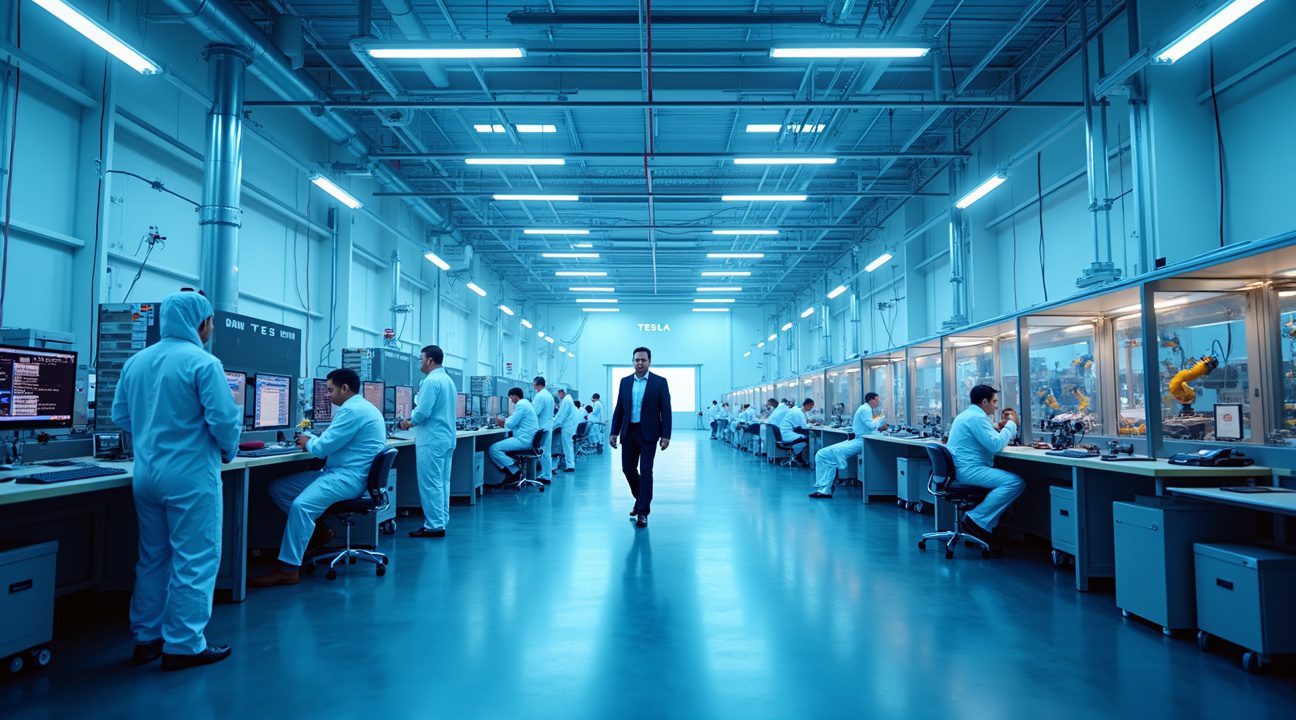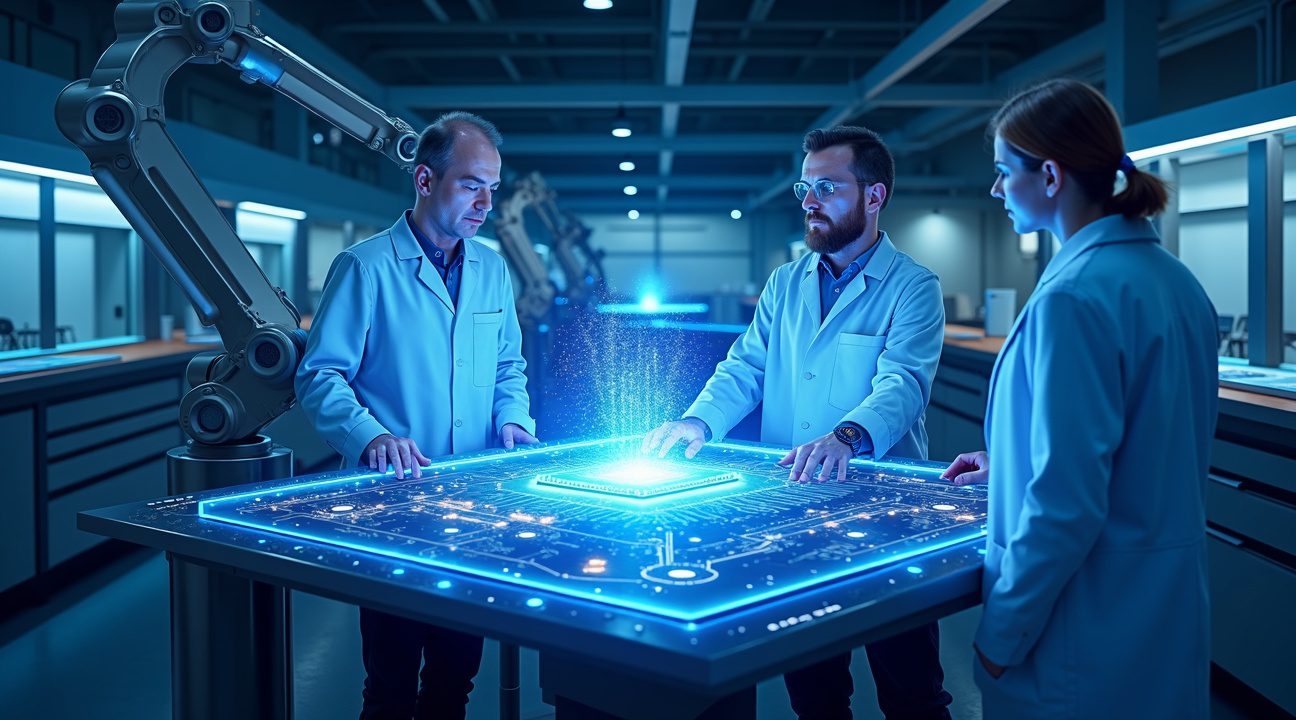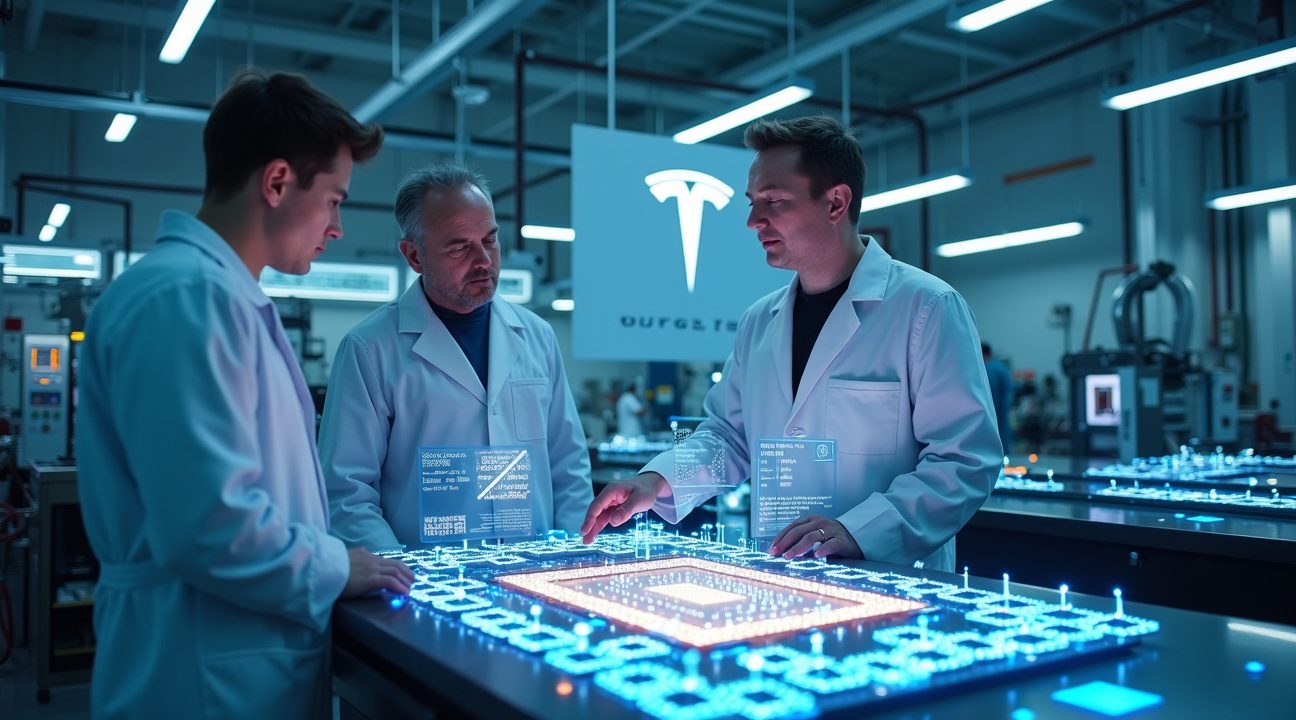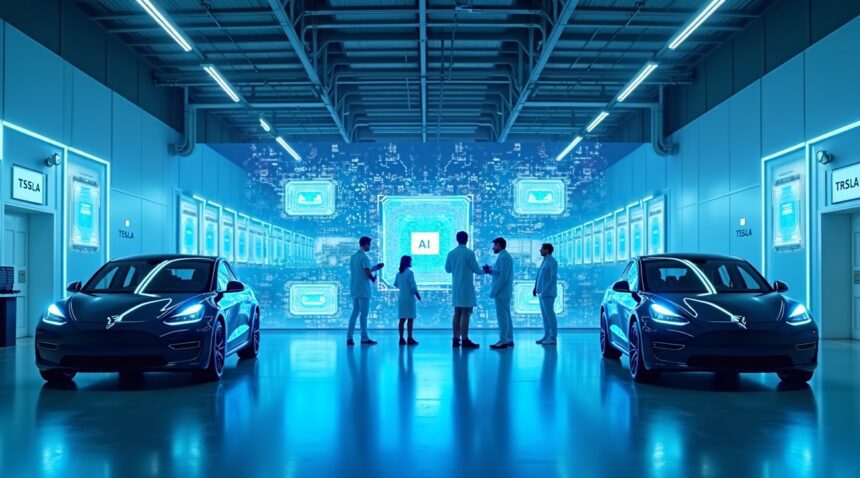Tesla establishes a commanding market position through its $16.5 billion semiconductor supply agreement with Samsung, running from July 2025 through December 2033. This revolutionary partnership focuses on producing Tesla’s next-generation AI6 chips using Samsung’s advanced 2nm process technology at their Taylor, Texas facility.
Key Takeaways
- Record-breaking automotive chip deal: The $16.5 billion agreement represents one of the largest semiconductor supply contracts in automotive industry history, providing Tesla with dedicated manufacturing capacity through 2033.
- Advanced AI6 chip production: Samsung will exclusively manufacture Tesla’s next-generation AI6 hardware using state-of-the-art 2nm process technology, significantly enhancing power efficiency and computational capabilities for autonomous driving.
- Strategic manufacturing partnership: Tesla retains complete design control while Samsung handles all production at their Taylor, Texas facility, with Elon Musk personally overseeing manufacturing optimization and yield improvements.
- Samsung stock surge and market validation: Samsung’s stock jumped 6.8% following the announcement, positioning the company as a serious competitor to TSMC in the automotive semiconductor market.
- US supply chain strengthening: The domestic production arrangement reduces Tesla’s dependence on overseas chip manufacturing while supporting federal initiatives to enhance America’s semiconductor supply chain security.
You can find more information about the collaborative chip manufacturing efforts at Samsung’s official website.
Samsung Scores Massive Victory with Record-Breaking AI Chip Supply Agreement
Tesla and Samsung Electronics just shook up the semiconductor industry with their groundbreaking $16.5 billion multiyear agreement. This massive deal centers on the supply and manufacture of advanced AI semiconductors that will power Tesla’s future vehicle lineup and autonomous driving capabilities.
The contract timeline spans from July 2025 through December 2033, establishing one of the largest chip supply agreements the automotive sector has ever witnessed. I’ve watched many partnership announcements over the years, but this collaboration stands out for its sheer scale and strategic importance for both companies.
Market Response and Financial Impact
Samsung’s stock price jumped 6.8% following the announcement, demonstrating strong investor confidence in the company’s foundry business prospects. This surge reflects broader market optimism about Samsung’s ability to capture significant market share in the competitive semiconductor manufacturing space.
The financial boost couldn’t come at a better time for Samsung Foundry, which has been working hard to establish itself as a serious competitor to industry leader TSMC. This Tesla partnership provides Samsung with the long-term revenue stability and credibility needed to attract additional high-profile clients.
Beyond the immediate stock gains, the deal positions Samsung as a key player in the automotive semiconductor revolution. The company’s advanced manufacturing capabilities will now directly support Tesla’s ambitious plans for expanded EV production and enhanced autonomous driving features.
Strategic Implications for Samsung’s Foundry Business
This agreement represents a major victory for Samsung Foundry in its ongoing battle with TSMC’s market dominance. For years, Samsung has struggled to match TSMC’s advanced node capabilities and customer relationships, particularly in the high-performance computing and AI chip sectors.
The Tesla deal changes that dynamic significantly. Samsung now has a flagship automotive client that validates its manufacturing expertise and technological capabilities. This validation effect often creates a snowball impact, where other major companies become more willing to consider Samsung as their foundry partner.
Several factors make this partnership particularly strategic for Samsung:
- Access to cutting-edge AI chip design requirements that will drive innovation
- Long-term revenue visibility spanning over eight years
- Opportunity to optimize manufacturing processes for automotive-grade semiconductors
- Enhanced credibility in the rapidly growing automotive AI market
- Platform for developing next-generation chip technologies
The automotive semiconductor market continues expanding rapidly as vehicles become more connected and autonomous. Samsung’s position in this deal puts the company at the forefront of supplying chips for Tesla’s expanding operations and technological advancement initiatives.
Tesla’s choice of Samsung over TSMC also signals confidence in Samsung’s ability to meet the demanding requirements of automotive AI applications. These chips must handle complex neural network processing while maintaining the reliability and safety standards essential for autonomous vehicle operations.
The partnership extends beyond simple manufacturing, with both companies likely to collaborate on optimizing chip designs for Tesla’s specific AI workloads. This close collaboration should accelerate innovation cycles and help Samsung develop expertise that translates to competitive advantages with future clients.
Looking ahead, this deal provides Samsung with the financial resources and technical experience to challenge TSMC more effectively across other market segments. The automotive AI expertise gained through this partnership could prove valuable as other automakers seek similar semiconductor solutions for their own autonomous driving initiatives.
The timing aligns perfectly with Samsung’s broader strategy to diversify its foundry customer base and reduce dependence on mobile device manufacturers. As the automotive industry undergoes its electric and autonomous transformation, partnerships like this one position Samsung to capitalize on one of the semiconductor industry’s fastest-growing segments.
Tesla’s AI6 Hardware Drives Need for Next-Generation Semiconductors
The initial production run under Tesla’s new partnership with Samsung will focus specifically on the automaker’s cutting-edge AI6 hardware platform. This advanced chip architecture represents a significant leap forward for Tesla’s upcoming vehicle models and the next iteration of their Full Self-Driving technology.
Tesla’s semiconductor strategy has evolved considerably over recent years. The company previously sourced FSD chips from multiple suppliers, including Samsung’s older fabrication nodes and TSMC’s more advanced 4nm and 5nm processes. This diversified approach, while providing flexibility, sometimes created supply chain complexities and performance inconsistencies across different hardware generations.
Samsung’s 2nm Process Technology Sets New Standards
Samsung will manufacture Tesla’s AI6 chips using its state-of-the-art 2nm fabrication process, marking a substantial technological advancement for automotive semiconductors. This manufacturing node delivers several critical benefits:
- Enhanced power efficiency reduces energy consumption in Tesla vehicles
- Increased transistor density allows more computational power within smaller chip footprints
- Improved thermal management enables sustained high-performance operation
- Advanced precision manufacturing reduces defect rates and improves reliability
The exclusive production capacity secured through this agreement ensures Tesla won’t face the supply constraints that have plagued the automotive industry in recent years. By locking in dedicated manufacturing slots at Samsung’s most advanced facilities, Tesla gains predictable access to the semiconductors needed for their ambitious production targets.
This technological leap positions Tesla’s AI6 hardware among the most sophisticated automotive computing platforms available. The 2nm process technology typically reserved for flagship smartphones and high-end data center processors will now power Tesla’s autonomous driving capabilities and in-vehicle AI systems.
The strategic shift to Samsung’s exclusive capacity also reflects Tesla’s confidence in their long-term chip requirements. Rather than competing with smartphone manufacturers and cloud computing giants for limited advanced semiconductor production, Tesla has secured dedicated manufacturing resources aligned with their specific automotive needs and timeline requirements.
Manufacturing Hub Established at Samsung’s Taylor, Texas Facility
Samsung’s cutting-edge Taylor, Texas plant serves as the production center for Tesla’s massive $16.5 billion chip supply agreement. This strategic location choice reinforces Texas as a critical manufacturing stronghold for both technology giants.
Local Economic Impact and Investment
The partnership brings substantial economic benefits to Texas through increased investment and job creation. Tesla’s commitment to sourcing chips from the Taylor facility strengthens the state’s position as a technology manufacturing hub, building on its existing significance to Tesla’s operations. Manufacturing jobs in semiconductor production typically offer competitive wages and technical skill development opportunities for local workers.
Local suppliers often benefit from proximity to major manufacturing operations, creating a ripple effect throughout the regional economy. The deal positions Texas as a strategic location for advanced chip production, potentially attracting additional technology investments to the area. This geographical clustering of technology companies frequently leads to knowledge sharing and innovation acceleration.
Musk’s Direct Involvement in Production Optimization
Elon Musk has publicly committed to personal involvement in ensuring efficient manufacturing and optimizing chip yields at the Texas facility. His hands-on approach reflects the critical importance Tesla places on this supply partnership. The proximity of the Taylor plant to Musk’s residence enables frequent oversight and direct problem-solving when manufacturing challenges arise.
Musk’s engineering background and experience with manufacturing optimization at Tesla’s vehicle production facilities brings valuable expertise to semiconductor manufacturing processes. His involvement typically includes:
- Direct consultation with production teams on yield improvement strategies
- Implementation of Tesla’s manufacturing principles adapted for chip production
- Regular facility visits to monitor progress and address bottlenecks
- Integration of Tesla’s quality control standards with Samsung’s production processes
- Coordination between Tesla’s engineering teams and Samsung’s manufacturing specialists
This level of executive involvement demonstrates Tesla’s strategic commitment to securing reliable chip supplies. Musk’s presence at the facility also facilitates rapid decision-making and problem resolution, potentially reducing typical manufacturing ramp-up timelines. His expertise in scaling production operations could prove invaluable in achieving optimal efficiency at the Samsung plant.
The Taylor facility’s location advantage extends beyond executive convenience. Texas offers favorable business conditions, including competitive electricity rates essential for energy-intensive semiconductor manufacturing. The state’s existing automotive supply chain infrastructure supports the integration of chip production with Tesla’s vehicle manufacturing needs.
Samsung’s investment in the Taylor plant represents a significant expansion of U.S. semiconductor manufacturing capacity. The facility’s advanced production capabilities align with Tesla’s requirements for high-performance automotive chips, supporting everything from autonomous driving systems to battery management.
The partnership leverages Samsung’s established expertise in semiconductor manufacturing while incorporating Tesla’s innovation-focused approach to production optimization. This collaboration model allows both companies to benefit from their respective strengths while addressing the growing demand for automotive semiconductors.
Manufacturing at the Taylor facility supports Tesla’s supply chain resilience goals by reducing dependence on overseas chip production. Domestic manufacturing provides greater control over production schedules and quality standards while minimizing shipping delays that have historically impacted automotive production.
The deal’s structure ensures long-term manufacturing stability for both partners. Samsung gains a committed customer for its Taylor facility output, while Tesla secures predictable chip supplies essential for its expanding vehicle production targets. This mutual benefit model encourages continued investment in manufacturing optimization and capacity expansion.

Tesla Retains Design Control While Samsung Handles Production
This strategic partnership establishes a clear division of responsibilities that plays to each company’s core strengths. Tesla maintains complete authority over hardware design decisions while Samsung focuses entirely on manufacturing excellence and process optimization. This arrangement marks a significant departure from Tesla’s previous approach of splitting semiconductor sourcing between Samsung and TSMC.
Strategic Partnership Structure
The collaboration framework allows Tesla engineers to continue developing cutting-edge chip architectures without concern for production constraints. Several key aspects define this partnership:
- Tesla retains full intellectual property rights over all chip designs
- Samsung provides dedicated manufacturing capacity and technical expertise
- Both companies will share real-time production data and quality metrics
- Joint engineering teams will work together on process improvements
- Tesla gains priority access to Samsung’s most advanced fabrication nodes
Samsung brings decades of semiconductor manufacturing experience to this partnership, while Tesla contributes its innovative design philosophy and deep understanding of automotive requirements. This combination creates a powerful synergy that neither company could achieve independently.
The shift away from the previous dual-supplier model reflects Tesla’s growing confidence in Samsung’s capabilities and the importance of establishing a reliable, single-source relationship. This change demonstrates Tesla’s commitment to streamlining its supply chain while maintaining the design freedom that has driven its technological advantages.
Tesla’s decision to centralize chip production with Samsung also provides greater visibility into manufacturing schedules and quality control processes. The partnership approach enables faster iteration cycles and more efficient communication between design and manufacturing teams.
Samsung’s role extends beyond simple contract manufacturing. The company will actively contribute process optimization insights and advanced packaging technologies that can enhance chip performance and reduce costs. This collaborative approach ensures that Tesla’s designs can be manufactured at scale while meeting the demanding reliability standards required for automotive applications.
The dedicated supply line arrangement addresses one of the automotive industry’s most pressing challenges: semiconductor availability. By securing a committed manufacturing partnership with Samsung, Tesla gains protection against supply disruptions that have plagued other automakers. This stability allows Tesla to plan production schedules with greater confidence and reduce inventory carrying costs.
Manufacturing expertise from Samsung complements Tesla’s design innovation perfectly. Samsung’s advanced process nodes and yield optimization capabilities will help Tesla achieve better performance per chip while maintaining cost competitiveness. The partnership structure also provides Tesla with access to emerging technologies like 3D chip stacking and advanced packaging techniques.
Tesla’s retention of design control ensures that the company can continue pushing the boundaries of automotive chip performance. This control allows Tesla to optimize chips for specific vehicle functions, from autonomous driving processing to battery management systems. Samsung’s manufacturing flexibility supports Tesla’s rapid design iteration cycles and enables quick responses to changing market demands.
The collaboration represents a mature approach to semiconductor sourcing that balances innovation with manufacturing reliability. Tesla gains the benefits of Samsung’s production scale and technical capabilities while maintaining the design freedom that differentiates its products in the market. This partnership model could serve as a template for other technology companies seeking to optimize their semiconductor supply chains.

Strategic Implications for Automotive AI and US Semiconductor Supply Chain
This monumental $16.5 billion partnership between Tesla and Samsung establishes a foundation for both companies to dominate the next generation of automotive artificial intelligence. The deal directly addresses Tesla’s growing appetite for specialized chips that power everything from Full Self-Driving capabilities to battery management systems. Samsung’s advanced semiconductor manufacturing expertise provides the technological backbone necessary for Tesla’s ambitious autonomous vehicle timeline.
Accelerating Vehicle Autonomy Development
The chip supply agreement fundamentally transforms how Tesla approaches vehicle autonomy development. Advanced AI processors from Samsung will enable more sophisticated neural network processing directly within Tesla vehicles. This enhanced computational power allows for real-time decision making that’s critical for safe autonomous driving. The partnership also supports Tesla’s vertical integration strategy, giving them greater control over the semiconductor components that differentiate their vehicles from traditional automakers.
Electric vehicle technology advancement receives a significant boost through this collaboration. Samsung’s cutting-edge chip manufacturing capabilities support the development of more efficient power management systems and enhanced battery performance monitoring. These improvements translate directly into longer range capabilities and faster charging times for Tesla vehicles.
The deal carries substantial implications for strengthening America’s semiconductor supply chain through increased domestic production capacity. Samsung’s commitment to expanding manufacturing operations in the United States aligns perfectly with federal initiatives to reduce dependence on foreign chip suppliers. This partnership demonstrates how private sector collaboration can address national security concerns while driving technological innovation.
Tesla’s strategic positioning through this deal extends beyond immediate chip supply needs. The company secures access to Samsung’s research and development pipeline for next-generation semiconductor technologies. This relationship provides Tesla with early access to emerging chip architectures specifically optimized for automotive applications.
The automotive industry watches closely as this partnership potentially reshapes competitive dynamics. Traditional automakers now face pressure to establish similar strategic relationships with semiconductor manufacturers or risk falling behind in the AI-powered vehicle race. Tesla’s partnership approach continues to influence how technology companies collaborate across industries.
Samsung benefits equally from this arrangement by securing a massive, long-term customer for their most advanced semiconductor products. The automotive sector represents a rapidly growing market segment for high-performance chips, and Tesla’s volume commitments provide Samsung with the stability needed for major capital investments in new manufacturing facilities.
This deal reinforces the critical importance of semiconductor supply chain security for the automotive industry. Companies that establish strong partnerships with leading chip manufacturers position themselves for success in an increasingly technology-dependent market landscape.
Elon Musk’s Personal Involvement Signals Deep Operational Partnership
Elon Musk’s decision to personally oversee this Samsung partnership demonstrates how critical this chip supply arrangement is for Tesla’s future. I’ve observed that when Elon Musk commits his time directly to operational details, the company typically achieves exceptional results across manufacturing efficiency and product quality.
Strategic Hands-On Leadership Approach
The Tesla CEO’s direct involvement in chip manufacturing optimization represents more than standard executive oversight. His presence at the Texas facility signals a collaborative working relationship that extends beyond traditional vendor partnerships. This approach allows for real-time problem-solving and immediate adjustments to manufacturing processes that could significantly impact chip yields.
Musk’s operational focus particularly centers on autonomous driving chip requirements, which demand precise specifications and consistent performance standards. The complexity of Tesla’s Full Self-Driving technology requires semiconductor components that meet stringent quality parameters, making direct leadership involvement essential for success.
Tesla’s approach contrasts sharply with typical automotive industry supplier relationships, where executives rarely engage in day-to-day manufacturing operations. I’ve noticed that this hands-on methodology often produces superior outcomes because it eliminates communication delays between engineering teams and executive decision-makers.
The partnership’s operational structure allows Samsung to leverage Musk’s engineering expertise while Tesla gains insights into advanced semiconductor manufacturing techniques. This knowledge exchange benefits both companies and positions them for continued innovation in automotive chip technology.
Manufacturing efficiency improvements become more achievable when leadership maintains direct oversight of production processes. Musk’s involvement ensures that any bottlenecks or quality issues receive immediate attention, potentially reducing downtime and maximizing output at the Texas facility.
The strategic importance of this arrangement extends beyond current production needs to encompass Tesla’s long-term autonomous vehicle goals. Advanced driver assistance systems and full autonomy require sophisticated processing capabilities that depend heavily on reliable chip supplies and consistent performance standards.
Tesla’s commitment to personal executive involvement reflects the company’s recognition that semiconductor partnerships will define competitive advantages in the electric vehicle market.
- Better pricing from semiconductor suppliers
- Priority allocation during global chip shortages
- Access to cutting-edge chip technologies
Companies that establish deeper operational relationships with chip manufacturers typically gain these advantages, positioning them ahead in the competitive electric vehicle landscape.

Sources:
MLQ.ai, “Samsung to Make Tesla AI Chips in Multiyear $16.5 Billion Texas Deal”
SemiWiki, “Samsung to Produce Tesla Chips in $16.5 Billion Multiyear Deal”
KVUE, “Elon Musk says Samsung’s Taylor factory will make Tesla chips in $16.5 billion AI deal”
CommonWealth English, “Samsung Lands $16.5B Chip Deal—Reportedly with Tesla”


